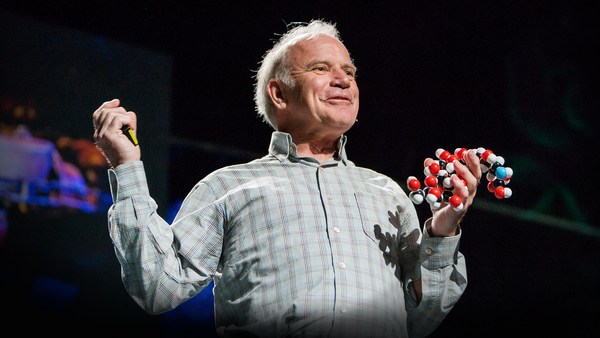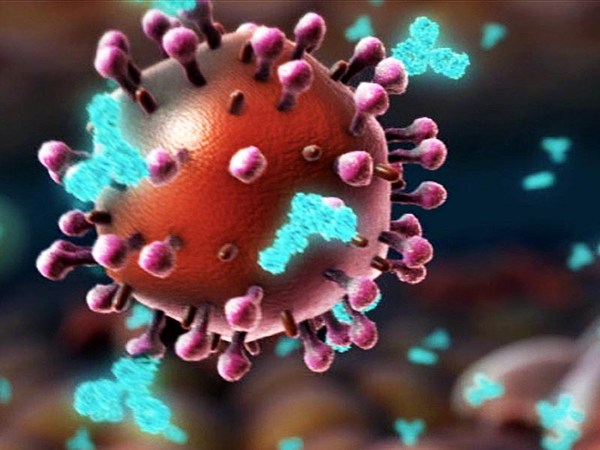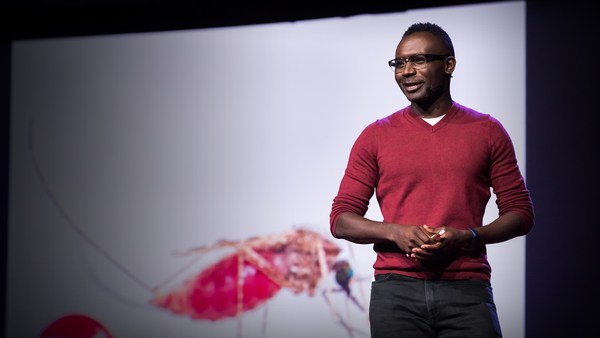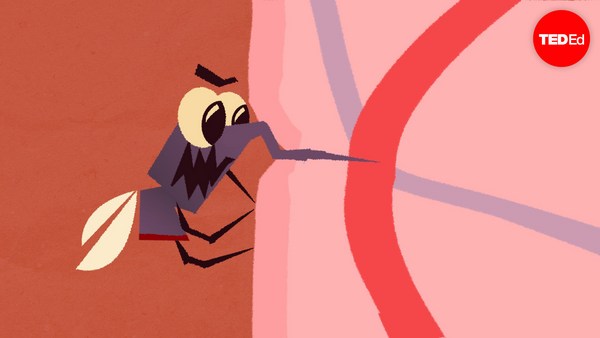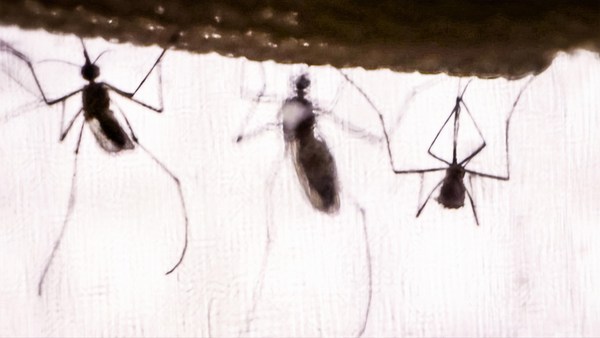(Mosquito buzzing)
(Mosquitos zumbando)
(Swat)
(Palmada)
Gotcha. Mosquitoes. I hate them. Don't you? That awful buzzing sound at night around your ears that drives you absolutely crazy? Knowing that she wants to stick a needle in your skin and suck out your blood? That's awful, right? In fact, there's only one good thing I can think of when it gets to mosquitoes. When they fly into our bedroom at night, they prefer to bite my wife.
¡Muerto! Mosquitos. Los odio. ¿Uds. no? ¿Ese zumbido horrible en los oídos toda la noche que te vuelve absolutamente loco? ¿Saber que quiere clavarte una aguja en la piel y chuparte sangre? Es horrible, ¿cierto? De hecho, solo hay una cosa buena que se me ocurre cuando se trata de mosquitos. Cuando vuelan en mi habitación de noche, prefieren picar a mi esposa.
(Laughter)
But that's fascinating, right? Why does she receive more bites than I do? And the answer is smell, the smell of her body. And since we all smell different and produce chemicals on our skin that either attract or repel mosquitoes, some of us are just more attractive than others. So my wife smells nicer than I do, or I just stink more than she does.
Fascinante, ¿cierto? ¿Por qué la pican más a ella que a mí? La respuesta es el olor, su olor corporal. Y ya que todos olemos diferente y producimos químicos en nuestra piel que atraen o repelen mosquitos, algunos somos más atractivos para ellos que otros. Mi esposa huele mejor que yo, o simplemente apesto más que ella.
Either way, mosquitoes find us in the dark by sniffing us out. They smell us. And during my PhD, I wanted to know exactly what chemicals from our skin African malaria mosquitoes use to track us down at night. And there's a whole range of compounds that they do use. And this was not going to be an easy task. And therefore we set up various experiments. Why did we set up these experiments? Because half the world's population runs the risk of contracting a killer disease like malaria through a simple mosquito bite. Every 30 seconds, somewhere on this planet, a child dies of malaria, and Paul Levy this morning, he was talking about the metaphor of the 727 crashing into the United States. Well, in Africa, we have the equivalent of seven jumbo 747s crashing every day. But perhaps if we can attract these mosquitoes to traps, bait it with our smell, we may be able to stop transmission of disease.
Como sea, los mosquitos nos encuentran en la oscuridad por el olfato. Nos huelen. Durante mi doctorado, quise saber exactamente qué químicos de nuestra piel usaban los mosquitos, los africanos transmisores de paludismo, para encontrarnos en la oscuridad. Y hay una gran cantidad de componentes que usan. Y no iba a ser una tarea fácil. Por eso, preparamos varios experimentos. ¿Por qué molestarse con estos experimentos? Porque la mitad de la población mundial corre el riesgo de contraer una enfermedad mortal como el paludismo por una simple picadura de mosquito. Cada 30 segundos, en algún lugar de este planeta, muere un niño de paludismo, y Paul Levy esta mañana hablaba de la metáfora de un avión 727 que se estrellara en EE.UU. Bueno, en África, tenemos el equivalente de 7 aviones Jumbo 747 estrellados cada día. Pero quizás, si atraemos a estos mosquitos a trampas, usando de cebo nuestro olor, podremos parar la transmisión de la enfermedad.
Now, solving this puzzle was not an easy thing, because we produce hundreds of different chemicals on the skin, but we undertook some remarkable experiments that managed us to resolve this puzzle very quickly indeed.
Resolver este rompecabezas no iba a ser fácil, ya que producimos cientos de componentes químicos en la piel, pero llevamos a cabo varios experimentos notables que nos permitieron resolver este rompecabezas rápidamente, de hecho.
First, we observed that not all mosquito species bite on the same part of the body. Strange. So we set up an experiment where we put a naked volunteer in a large cage,
Primero, observamos que no todas las especies de mosquitos pican en la misma área del cuerpo. Extraño. Entonces preparamos un experimento en que pusimos a un voluntario desnudo en una
(Laughter)
jaula grande y liberamos mosquitos
and in that cage, we released mosquitoes to see where they were biting on the body of that person. And we found some remarkable differences. On the left here you see the bites by the Dutch malaria mosquito on this person. They had a very strong preference for biting on the face. In contrast, the African malaria mosquito had a very strong preference for biting the ankles and feet of this person. And that, of course, we should have known all along, because they're called mosqui-toes, you see?
para ver en qué parte del cuerpo se concentraban. Y encontramos diferencias llamativas. A la izquierda pueden ver las picaduras del mosquito de paludismo holandés en esta persona. Mostraron una fuerte preferencia por picar en la cara. En contraste, el africano tenía una fuerte preferencia por picar los tobillos y los pies de esta persona, y claro, lo deberíamos haber sabido ya que se llaman mosqui-dedos del pie. (Risas)
(Laughter)
That's right.
Así es. (Aplausos)
(Applause)
Y así, empezamos a centrarnos en el olor de los pies,
And so we started focusing on the smell of feet ... on the smell of human feet, until we came across a remarkable statement in the literature that said that cheese smells after feet rather than the reverse. Think of it. And this triggered us to do a remarkable experiment. We tried, with a tiny little piece of Limburger cheese, which smells badly after feet, to attract African malaria mosquitoes. And you know what? It worked. In fact, it worked so well that now we have a synthetic mixture of the aroma of Limburger cheese that we're using in Tanzania and has been shown there to be two to three times more attractive to mosquitoes than humans. Limburg, be proud of your cheese, as it is now used in the fight against malaria.
en el olor de los pies humanos, hasta que dimos con una afirmación llamativa en la literatura que reza que el queso huele más que los pies en lugar de al revés. Piensen en ello. Y esto nos llevó a hacer un experimento notable. Intentamos, con un delgado trozo de queso limburger, que huele peor que los pies, atraer a los mosquitos africanos de la malaria. ¿Y saben qué? Funcionó. De hecho, funcionó tan bien que ahora tenemos una mezcla sintética del aroma del queso limburger que usamos en Tanzania y ha demostrado ser de dos a tres veces más atrayente para los mosquitos que los seres humanos. Limburg, estén orgullosos de su queso, ya que ahora se utiliza en la lucha contra la malaria.
(Applause)
(Aplausos)
That's the cheese, just to show you.
Este es el queso, solo para mostrarles.
My second story is remarkable as well. It's about man's best friend. It's about dogs. And I will show you how we can use dogs in the fight against malaria. One of the best ways of killing mosquitoes is not to wait until they fly around like adults and bite people and transmit disease. It's to kill them when they're still in the water as larvae. Why? Because they are just like the CIA. In that pool of water, these larvae are concentrated. They're all together there. They are immobile. They can't escape from that water. They can't fly. And they're accessible. You can actually walk up to that pool and you can kill them there, right?
Mi segunda historia es también notable. Es sobre el mejor amigo del hombre. Es sobre perros. Y les mostraré cómo podemos utilizar perros en la lucha contra la malaria. Una de las mejores maneras de matar mosquitos es no esperar a que vuelen por ahí como adultos, piquen a personas y transmitan la enfermedad. Es acabar con ellos cuando en el agua todavía son larvas. Porque son como la CIA. [Concentrados Inmóviles Accesibles] Estas larvas se concentran en los charcos. Están allí todas juntas. Inmóviles. No pueden escapar del agua. No pueden volar. Y son accesibles. Uno puede en realidad ir al charco y matarlas, ¿correcto?
So the problem that we face with this is that, throughout the landscape, all these pools of water with the larvae, they are scattered all over the place, which makes it very hard for an inspector like this to actually find all these breeding sites and treat them with insecticides. And last year we thought very, very hard, how can we resolve this problem? Until we realized that just like us -- we have a unique smell -- mosquito larvae also have a very unique smell.
Así el problema que enfrentamos con esto es que, a lo largo del paisaje, todos estos charcos de agua con las larvas, están dispersos por todas partes, lo que hace muy difícil para un inspector como este realmente encontrar todos estos sitios de cría y tratarlos con insecticidas. Y el año pasado nos pareció muy, muy difícil, ¿cómo podíamos resolver este problema? Hasta que nos dimos cuenta de que al igual que nosotros, que tenemos un olor único, las larvas de mosquito también tienen un olor único.
And so we set up another crazy experiment, because we collected the smell of these larvae, put it on pieces of cloth, and then did something very remarkable. Here we have a bar with four holes and we put the smell of these larvae in the left hole. Oh, that was very quick. And then you see the dog. It's called Tweed. It's a border collie. He's examining these holes and now he's got it already. He's going back to check the control holes again, but he's coming back to the first one, and now he's locking into that smell, which means that now, we can use dogs with these inspectors to much better find the breeding sites of mosquitoes in the field, and therefore have a much bigger impact on malaria. This lady is Ellen van der Zweep. She's one of the best dog trainers in the world, and she believes that we can do a lot more. Since we also know that people that carry malaria parasites smell different compared to people that are uninfected, she's convinced that we can train dogs to find people that carry the parasite. That means that in a population where malaria has gone down all the way and there's few people remaining with parasites, that the dogs can find these people, we can treat them with antimalarial drugs and give the final blow to malaria. Man's best friend in the fight against malaria.
Entonces, diseñamos otro experimento loco, porque recolectamos el olor de estas larvas, lo pusimos en trozos de tela, y luego hicimos algo muy notable. Aquí tenemos una barra con cuatro agujeros, y ponemos el olor de estas larvas en el orificio izquierdo. Oh, fue muy rápido. Y luego vean el perro. Se llama Tweed. Es un pastor escocés. Está examinando los orificios, y ya lo consiguió. Volverá a revisar los orificios de control pero regresará al primero, y ahora está fijo en ese olor, lo que significa que podemos utilizar perros con estos inspectores para encontrar mejor los criaderos de mosquitos en el campo, y por lo tanto, tener un mucho mayor impacto sobre el paludismo. Esta señora es Ellen van der Zweep. Es una de las mejores adiestradoras de perros del mundo y cree que podemos hacer mucho más. Ya sabemos también que las personas que llevan los parásitos de la malaria huelen diferente de las personas no infectadas, y ella está convencida de que podemos entrenar perros encontrar a personas que lleven el parásito. Esto significa que en una población donde la malaria haya sido dominada y haya pocas personas con parásitos, los perros pueden encontrarlas, podemos tratarlas con medicamentos contra el paludismo y dar el golpe definitivo a la malaria. El mejor amigo del hombre en la lucha contra la malaria.
My third story is perhaps even more remarkable ... and, I should say, has never been shown to the public until today.
Mi tercera historia es quizás aún más notable, y, debo decir, nunca se ha mostrado en público, hasta hoy.
(Audience cheers)
Sí.
Yeah. It's a crazy story, but I believe it's perhaps the best and ultimate revenge against mosquitoes ever. In fact, people have told me that now they will enjoy being bitten by mosquitoes. And the question of course is, what would make someone enjoy being bitten by mosquitoes? And the answer I have right here ... in my pocket --
Es una historia loca, pero creo que quizás es la mejor y última revancha contra los mosquitos. De hecho, algunas personas me han dicho que ahora podrán disfrutar de las picaduras de los mosquitos. Y por supuesto la pregunta es, ¿qué haría que alguien disfrutara de ser picado por mosquitos? Y la respuesta la tengo aquí en mi bolsillo...
(Laughter)
si la encuentro...
if I get it. It's a tablet. A simple tablet, and when I take it with water ... it does miracles. Thank you.
Es una pastilla, una simple pastilla, y cuando la tomo con agua, hace milagros. Gracias. (Bebe)
Now, let me show you how this works. Here in this box, I have a cage with several hundred hungry female mosquitoes ...
Ahora, permítanme mostrarles cómo funciona. Aquí en esta caja tengo una jaula con varios cientos de
(Laughter)
mosquitos hembras hambrientos
that I'm just about to release.
que estoy a punto de soltar. (Risas)
(Laughter)
Es broma, es broma.
Just kidding, just kidding.
(Laughter)
Les mostraré que voy a meter mi brazo
What I'm going to show you is, I'm gonna stick my arm into it and I will show you how quickly they will bite. There we go. Don't worry, I do this all the time in the lab. There we go. OK. Now, on the video -- on the video here, I'm going to show you exactly the same thing, except that what I'm showing you on the video happened one hour after I took the tablet. Have a look. That doesn't work. OK. Sorry about that. I'm sticking in my arm, I'm giving them a big juicy blood meal, I'm shaking them off, and we follow them through time to see these mosquitoes get very, very sick indeed, here shown in fast motion. And three hours later, what we see at the bottom of the cage is dead mosquitoes ... very dead mosquitoes. And I'm going to say, ladies and gentlemen, we have swapped the cards with mosquitoes. They don't kill us. We kill them.
y verán cómo rápidamente me pican. Allá vamos. No se preocupen, lo hago todo el tiempo en el laboratorio. Allá vamos. Bien. Ahora, en el video, el video aquí, les mostraré exactamente lo mismo, salvo que lo que les muestro en el video pasó una hora después de que me tomé la pastilla. Miren. Esto no funciona. Está bien. Lo siento. Estoy poniendo mi brazo, les doy una gran comida de jugo de sangre, los sacudo, y los seguimos un tiempo para ver estos mosquitos ponerse muy, muy enfermos de hecho, aquí se muestra aceleradamente, y tres horas más tarde lo que vemos en la parte inferior de la jaula es mosquitos muertos, mosquitos muy muertos y les diré, señoras y señores, que hemos intercambiado los papeles con los mosquitos. No nos matan. Los matamos nosotros.
(Applause)
(Aplausos)
Now --
Ahora —(Risas)
(Laughter) Maastricht, be prepared. Now, think of what we can do with this. We can actually use this to contain outbreaks of mosquito-born diseases, of epidemics, right? And better still, imagine what would happen if, in a very large area, everyone would take these drugs, for just three weeks. That would give us an opportunity to actually eliminate malaria as a disease.
Maastricht, estén preparados—. ahora piensen en lo que podemos hacer con esto. Podemos realmente utilizar esto para contener los brotes de enfermedades por mosquitos, epidemias, ¿de acuerdo? Y mejor aún, imaginemos lo que ocurriría si, en un área muy grande, todo el mundo tomase estos medicamentos, esta medicina, por tan solo tres semanas. Nos daría la oportunidad de eliminar realmente la malaria como enfermedad.
So cheese, dogs and a pill to kill mosquitoes. That's the kind of out-of-the-box science that I love doing ... for the betterment of mankind, but especially for her, so that she can grow up in a world without malaria.
Así que: queso, perros y una píldora para matar mosquitos. Esa es la clase de ciencia no convencional que me encanta hacer, para ayudar a la humanidad, pero especialmente a ella, para que puede crecer en un mundo sin malaria. Gracias. (Aplausos)
Thank you.
(Applause)

